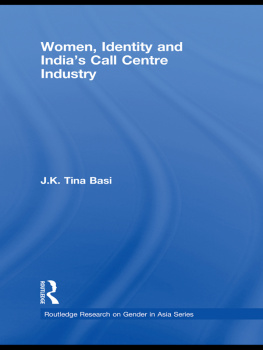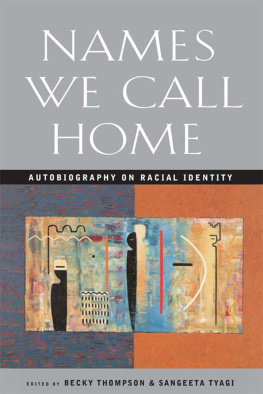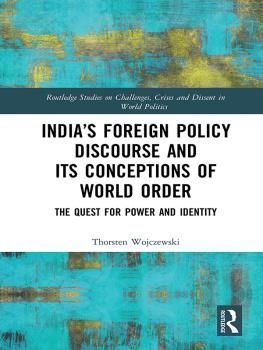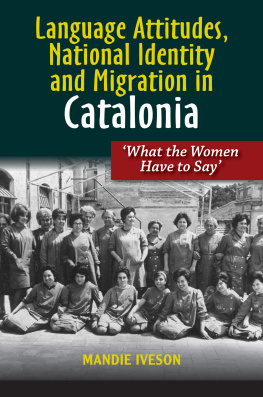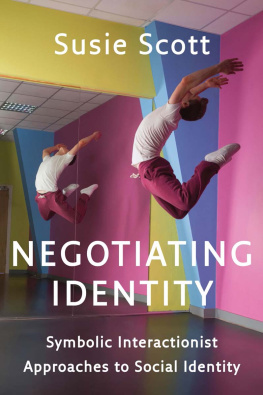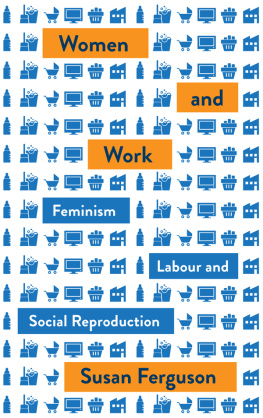This is a modern book for modern times. Basi defies conventional wisdom that call centre employment is either Indias post colonial revenge or globalisations way of destroying national identity and in true feminist tradition, privileges the experiences of the women themselves. She explores the lives, experiences and aspirations of young women working in call centres in New Dehli outsourced from the UK and examines the ways in which they negotiate patriarchal expectations of management family and culture, actively constructing new identities which work for them in the new India. This is a compelling account of fast changing industry which Basi captures with sophisticated theoretical analysis as well as a womans eye and understanding.
Ruth Pearson, Director, Centre for Development Studies,
University of Leeds
Tina Basi makes an invaluable contribution to discussions on globalization and postcolonial subjectivity through a captivating study of women call centre workers in India referencing their lives inside and outside the workplace. The focus on identity and agency ensures the emergent picture is one of complexity and contradiction, exploitation and empowerment, challenging singular depictions of docility prevalent in the literature to date.
Diane Perrons, Gender Institute, London School of Economics
Women, Identity and Indias Call Centre Industry
This book examines the concept of globalized identities and the way in which agency is exercised over identity construction by women working in Indias transnational call centre industry.
Drawing on qualitative empirical data and extensive original fieldwork, the book provides a nuanced analysis of the experiences of Indian women call centre workers and the role of womens participation in the global labour market. The author uses social, cultural and historical factors to create a framework for examining the processes of identity construction. Within this framework, the book explores the impact of the call centre labour process on the social landscape of urban centres in India and the way in which this has impacted upon transformations and shifts in society in relation to gendered, sexual and generational relationships. Highlighting the significance of identity in a globalised world, the author argues that identity acts as one the most powerful constructs in transforming global scapes and flows of culture and economics.
This book will be of interest to academics working on South Asia, gender and labour studies and issues of globalization, identity and social change.
J.K. Tina Basi holds a PhD in Gender Studies and Sociology from the University of Leeds. Previously a freelance ethnographic researcher with Intels Digital Health Group in Ireland, she has also established a consultancy, Mehfil Enterprise, conducting corporate ethnography in media and technology related industries. She is currently working on a new ethnographic research project about spirituality.
Routledge Research on Gender in Asia Series
- 1 Women, Identity and Indias Call Centre Industry
- J.K. Tina Basi
Women, Identity and
Indias Call Centre Industry
J.K. Tina Basi

First published 2009
by Routledge
2 Park Square, Milton Park, Abingdon, Oxon OX14 4RN
Simultaneously published in the USA and Canada
by Routledge
270 Madison Ave, New York, NY 10016
Routledge is an imprint of Taylor & Francis Group, an informa business
This edition published in the Taylor & Francis e-Library, 2009.
To purchase your own copy of this or any of Taylor & Francis or Routledges collection of thousands of eBooks please go to www.eBookstore.tandf.co.uk.
2009 J.K. Tina Basi
All rights reserved. No part of this book may be reprinted or reproduced or utilised in any form or by any electronic, mechanical, or other means, now known or hereafter invented, including photocopying and recording, or in any information storage or retrieval system, without permission in writing from the publishers.
British Library Cataloguing in Publication Data
A catalogue record for this book is available from the British Library
Library of Congress Cataloging in Publication Data
Basi, JK Tina.
Women, identity and Indias call centre industry / JK Tina Basi.
p. cm. (Routledge research on gender in Asia series ; 1)
Includes bibliographical references and index.
1. Call centersIndia. 2. Women employeesIndia. I. Title.
HE8789.B37 2009
331.4813811420954dc22 2008045887
ISBN 0-203-88379-9 Master e-book ISBN
ISBN 978-0-415-48228-8 (hbk)
ISBN 978-0-203-88379-2 (ebk)
Dedicated to the memory of Barbara Powell,
for calling to the rebel within and daring me to try.
Figures
Cover of India Today, 18 November 2002
Two women making calls
Two women on their coffee break in the call centre
Call centre floor
Multiplex and shopping centre in Gurgaon
Shantytown behind call centre in Gurgaon
Cover of India Today, 13 June 2005
Zaika, a dhaba in Gurgaon
Acknowledgements
This book has been a real labour of love. Beginning with academic research that saw me transition from Regina to Leeds to Delhi to London, its been quite a journey. Along the way I shed a lot of skins and experienced the reality of being a cosmopolitan citizen wearing labels and badges in multiple, and sometimes simultaneous, contexts. There were many people who helped along the way and I offer my thanks.
My supervisors Sasha Roseneil, now at the Birkbeck Institute for Social Research, and Ruth Pearson, in Politics and International Studies at the University of Leeds, were not only patient and supportive, but also truly inspirational. With Sasha and Ruth you never bring your B game and the rigorous challenges they offered often pushed me past my comfort zone. I doubt I can come up with the words to appropriately acknowledge all that they did and continue to do, so instead I follow their lead and pay it forward. Max Farrar at Leeds Metropolitan University offered me a job in the final few months of my PhD and has remained a source of support and encouragement in all things professional and all things personal too, and, of course, John Roberts, thank you, for making me laugh through all of it and reminding me never to take myself too seriously.
The Economic Social Research Council funded my PhD research and my year of fieldwork in India. Radhika Chopra at the Delhi School of Economics and the staff and members of the Centre for Womens Development Studies, the Centre for the Study of Developing Societies and SARAI, all based in Delhi, were gracious and helpful in pointing me towards archives and sources to fill in the gaps around my interviews. Of course this book would not exist if it werent for those interviews and I thank the women whose stories Ive been allowed to share: Sangamitra, Indu, Ritu, Anshu S., Swati, Rashi, Preetika, Anshu P., Neha, Jennifer, Pooja, Nidhi, Amrit, Urmila, Sonali, Gurmeet, Seema, Anyuta, Shvetangana, Reetika, Dipti, Nimisha, Reena, Smita, Chanelle, Harsh-deep, Yashica, Upasana, Nisha, Monica, Namita and Sunita. Thanks also to India Today Group for granting copyright permission to use two of their cover photos.
My life in India was enriched by three very important people: Charu Nagrath and Rishi Levi revealed to me an India I never knew to exist I have never been the same since; and Randeep Chandyoke, thank you for EVERYTHING I really owe you I wouldnt have survived in the depths of Pahar Ganj if you hadnt found me. Pratibha Sawhney and her family provided a warm and safe home on Hanuman Road, in Connaught Place, as well as offering up countless opportunities to discuss and experience life in Delhi, especially Banita and Harpreet, who were both working in call centres at the time. Kapil Sharma was an amazing gateway to the call centres and his help in negotiating that entry as well as the introduction to late night socializing was crucial in gathering the research for this book.

